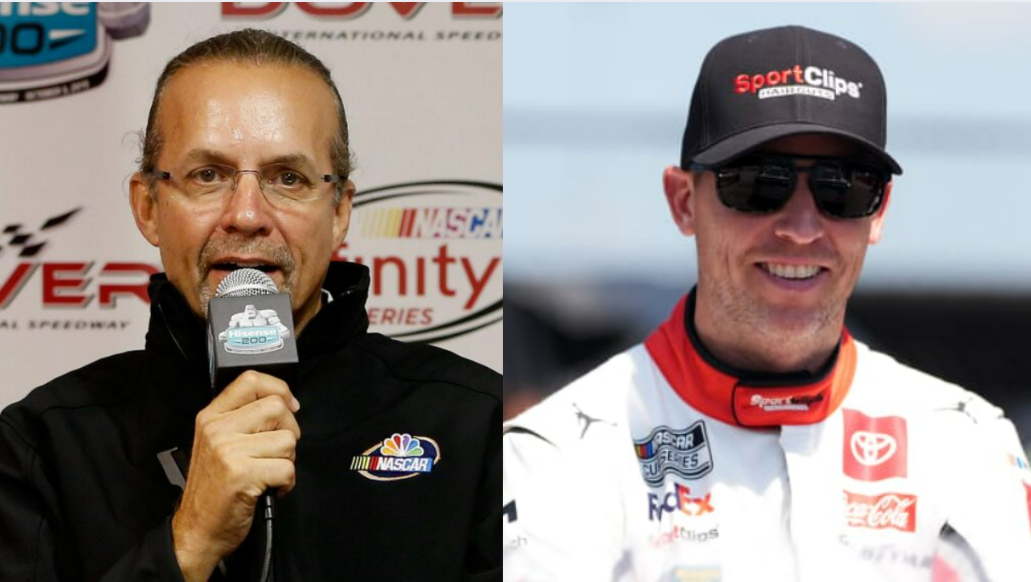

Kyle Petty has stirred the waters with a bold defense of the NASCAR Gen-7 car, standing out in contrast to the wave of criticism from fans and even some drivers. His words challenge the consensus that modern design has stripped away the competitive or dramatic elements that defined previous NASCAR eras.
Watch What’s Trending Now!
Now, Danny Hamlin, one of the sport’s most experienced and outspoken drivers, echoes key parts of Petty’s message, adding his technical critique to the conversation. As the Cup Garage prepares for Saturday’s Cook Out 400, the echo between driver and analyst lifts the Next Gen debate into a new focus.
Denny Hamlin sounds off on Kyle Petty’s Gen-7 claims
Kyle Petty has adamantly defended the NASCAR Next Gen car amid widespread backlash, describing it as a necessary evolution in the sport. In acknowledging safety and design upgrades, he rejects the push for parity and craves dynamic rivalry, as he puts it, “I will never ever applaud parody. I hate it. I hate it. I want somebody that I have to chase… right now, I measure myself against everybody. And everybody’s the same.”
And many fans disagree with Petty, especially online, reacting strongly against his positive stance. The criticism grew so intense that Kyle Petty took to X to explain his view, arguing that innovation in NASCAR has been proactive rather than reactive since the early 2000s. He posted, “The problem right now is we live in a world of instant gratification. No one wants to wait.”
And now Denny Hamlin has come in clutch for Petty’s argument. He shares the same sentiment while grounding his agreement in technical rationale. He went on to say, “I mean, he’s right in that sense, certainly that, you know, it’s not a stock car, you know, talking about, you know, I definitely heard him talking about, you know, we used to just bring a car off the street and turn into a race car. Obviously, those days have been gone for decades now. Yeah, so he’s definitely partially right.”
Denny Hamlin emphasizes that, early in the Next Gen era, the disparity between fast and slow cars fuels excitement. Now with standardized cars and little development, the field has tightened so much that drivers struggle to pass slower cars, especially on tracks where only a few tenths of a second matter.
Denny Hamlin was asked to respond to Kyle Petty’s take on the Next Gen car given Hamlin’s criticisms of the car. He said Petty is actually right about certain things, but pointed to how the best racing the car has put on was early in its lifetime when not everyone had figured out… pic.twitter.com/N8eLfInmUU
— Steven Taranto (@STaranto92) August 15, 2025
Because nearly every component is now sourced from a single supplier, there is minimal variance between cars. That leaves little advantage even for elite drivers and cars, making exciting wheel-to-wheel racing rare. This issue is especially pronounced on short tracks like Richmond, Martinsville, and Bristol. They used to be the showstopper of venues, but now struggle to reproduce the close quarters, high-drama racing that made them legendary.
The Joe Gibbs Racing driver added, “We’re coming here with a more aggressive tire. You got to applaud that, that they’re, they’re willing to do it. And it came from trying it last year. But beyond that, it’s, we’ve got to fix the attitude. I’ve said it a million times on my podcast, getting rid of the underbody, um, downforce and putting it on the overbody. So you have the ability, like you do in the Xfinity Series, to drive up behind someone and get them off the bottom.”
While the NASCAR Cup Series embraced the Gen-7 car beginning in 2022, the Xfinity Series continues to race vehicles based on an old paradigm, rooted in the Cars of Tomorrow formula first introduced in 2010. Unlike the tech-heavy, spec-oriented Cup cars, Xfinity machines retained traditional features such as five-lug steel wheels, an H-pattern four-speed gearbox, and a rear exhaust layout.
These cars are shorter, narrower, and lighter than their Cup counterparts, with a shorter wheelbase and unique composite body panels. Drivers and fans often praise the Xfinity cars for delivering a pure old-school driving experience, less aerodynamic dependency, and more driver input, creating a deeper connection to traditional stock car racing than the NASCAR Cup Series.
And now, as Hamlin starts fourth at Richmond, reliving the 2024 incident, the No. 11 driver comes in with a much calmer mind. Among all these inputs and views, Hamlin has also charted out his deadline for NASCAR and has announced his plans for retirement.
Denny Hamlin declares 2026 may be his last racing year
At 44, Denny Hamlin’s legacy in NASCAR is already secure with 58 career victories, placing him among the sport’s most dedicated drivers. Yet, despite his decorated resume, one glaring omission continues to define the narrative around his career: the elusive Cup Series championship. Hamlin himself acknowledges that the window to secure the title is narrowing with each passing season.
And recently, Hamlet admitted that he has begun preparing mentally for the end of his career, suggesting that the 2026 season could mark his final lap as a full-time driver. He revealed that he is working through the process of accepting retirement, a shift that doesn’t come easily for a competitor who has been entrenched in the sport for nearly 2 decades. Still, Hamlin is realistic, conceding that while his contract may be his last, circumstances beyond his control could alter the timeline.
During a race weekend at Indianapolis, Hamlin described a moment of clarity, reflecting on just how limited his opportunities have become to finally capture the title he has long chased. His comments carried both resolve and acceptance as he said, “There could be tons of outside factors that change it, but I’m going to try to see this as the last one [contract].” It was a candid glimpse into a driver who, while still competing at the highest level, is beginning to consider life beyond the cockpit.
For now, however, Hamlin remains firmly in the hunt. With 4 Cup Series wins already in 2025, and the top spot of the playoff standings secured, he continues to prove he has the skill and determination to contend with NASCAR’s best. As he eyes the final chapters of his career, Hamlet’s focus is clear: chasing the one prize that has eluded him and defining his legacy with a long-awaited championship.








